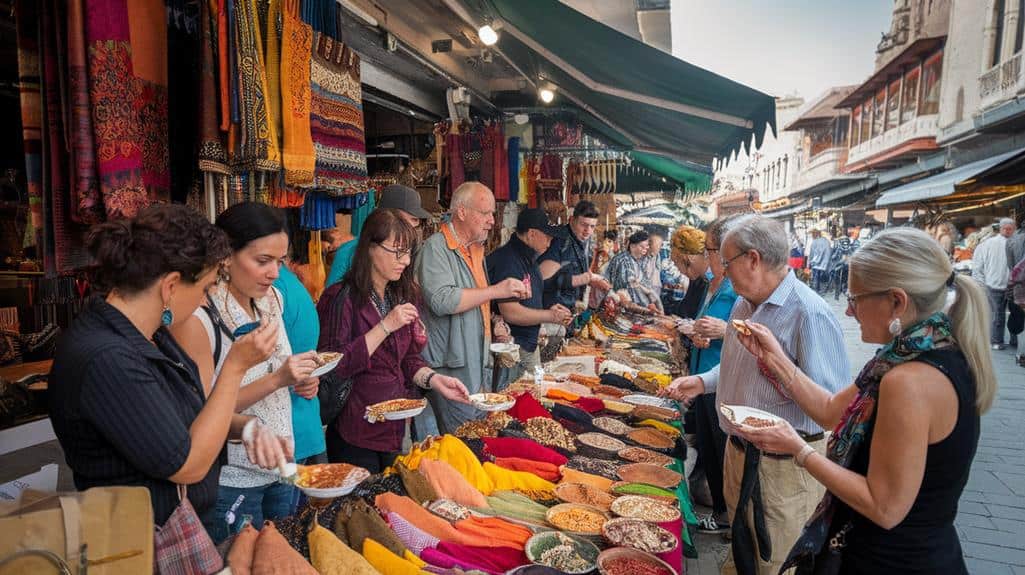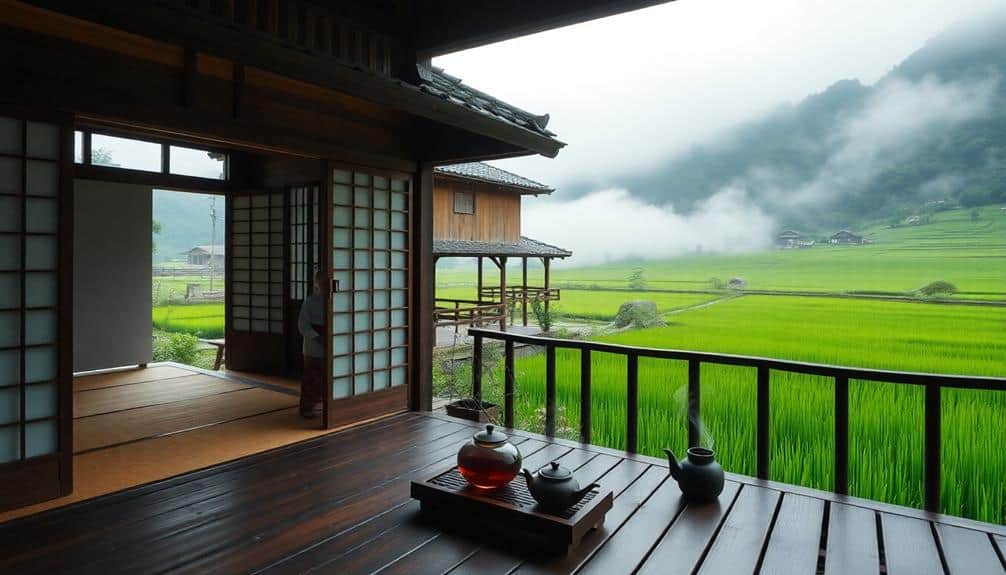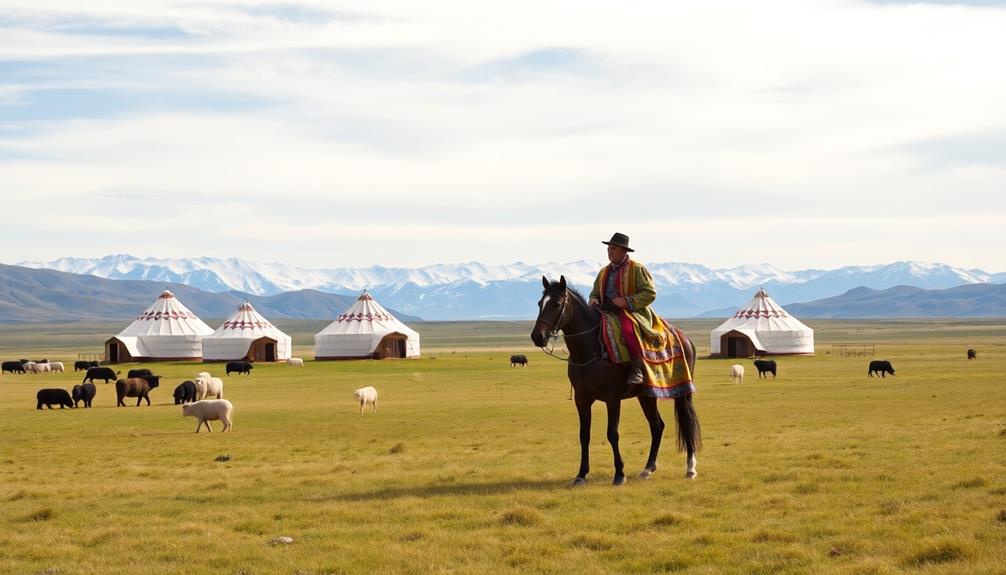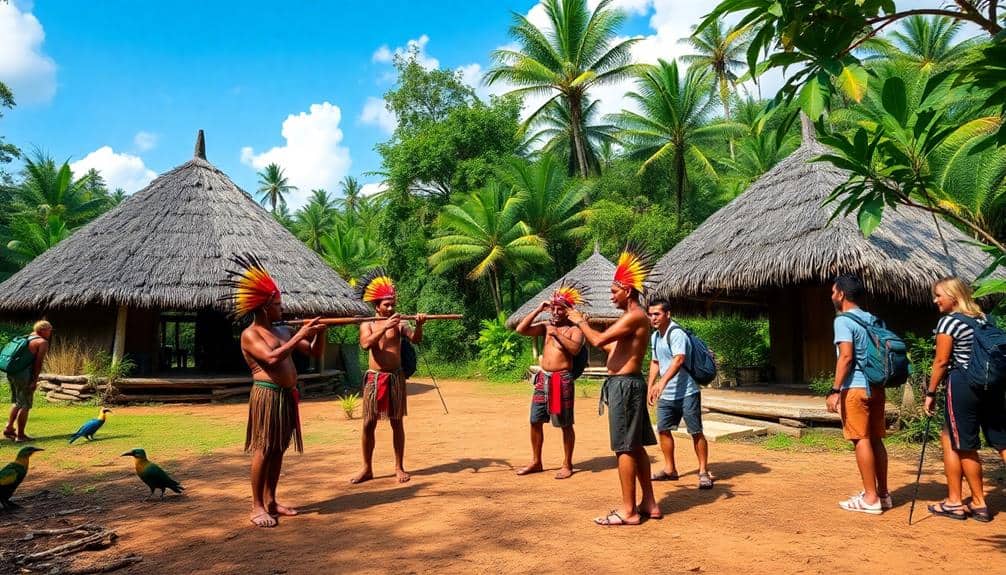
3 Best Cultural Immersion Adventures for Global Travelers
For global travelers seeking authentic cultural immersion, three standout adventures await. In rural Japan, you'll experience tranquil farmhouse stays, participating in traditional activities like tending rice paddies and preparing local cuisine. Mongolia's nomadic lifestyle immerses you in the daily routines of herders, where you'll sleep in gers, assist with livestock, and learn ancient customs. Deep in the Amazon rainforest, you can connect with indigenous tribes, learning their hunting techniques, medicinal plant use, and participating in sacred ceremonies. Each adventure offers unique insights into centuries-old traditions, sustainable practices, and non-verbal communication skills. Exploring these immersive experiences will disclose the intricate tapestry of global cultures and ancient ways of life.
In a Nutshell
- Rural Japanese homestays offer authentic experiences in traditional farmhouses and agricultural activities.
- Mongolian nomadic lifestyle immersion allows participation in herding, traditional cuisine, and ancient customs.
- Amazonian tribe cultural exchanges provide insight into indigenous ways of life and rainforest survival skills.
- These experiences offer unique opportunities to practice local languages and non-verbal communication.
- Participants gain hands-on experience with traditional skills, from rice farming to horseback riding and weaving.
Homestays in Rural Japan

Tranquility awaits in rural Japan's homestay experiences. You'll find yourself immersed in traditional Japanese culture, far from the bustling cities. These homestays, often in centuries-old farmhouses, offer a unique opportunity to live alongside local families. You'll participate in daily activities, from tending rice paddies to preparing traditional meals. Many hosts speak limited English, encouraging you to practice your Japanese and rely on non-verbal communication. Accommodations are typically simple, with futons on tatami floors and shared bathrooms. You'll gain insight into Japan's agricultural heritage, learning about local crops and farming techniques. Evening activities might include visiting nearby onsen (hot springs) or joining community festivals. For those seeking travel guide inspiration, rural Japanese homestays offer an authentic cultural immersion experience that goes beyond typical tourist attractions. To book a rural homestay, research reputable organizations that facilitate cultural exchanges, ensuring a safe and authentic experience. Advance booking is essential, as availability can be limited.
Mongolian Nomadic Lifestyle Experience

Venturing into the vast Mongolian steppes, you'll find yourself transported to a world where nomadic traditions still thrive. Immerse yourself in the daily life of Mongolian herders, learning their ancient customs and survival skills. You'll stay in traditional gers (yurts), experiencing the simplicity and practicality of these portable dwellings. During your stay, you'll have the opportunity to:
- Assist with herding livestock, including horses, yaks, and camels
- Learn to prepare traditional Mongolian cuisine, such as buuz and airag
- Participate in archery and horseback riding, essential nomadic skills
- Observe and engage in local spiritual practices, including shamanic rituals
To maintain your fitness routine while experiencing nomadic life, consider packing travel-friendly fitness gear that's compact and versatile. This will allow you to stay active even in remote locations.
As you adapt to the rhythms of nomadic life, you'll gain a deep appreciation for the resilience and ingenuity of these communities. This immersive experience offers unparalleled insights into a vanishing way of life, challenging your perspectives and fostering cultural understanding.
Amazonian Tribe Cultural Exchange

Deep in the heart of the Amazon rainforest, you'll find an unparalleled opportunity to connect with indigenous tribes and their ancient ways of life. These cultural exchanges offer immersive experiences where you'll learn traditional hunting techniques, medicinal plant use, and intricate weaving methods. You'll participate in sacred ceremonies, sleep in traditional thatched huts, and navigate the dense jungle alongside experienced guides. Many programs focus on sustainable tourism, ensuring minimal impact on the fragile ecosystem and supporting local communities. Before setting out on this adventure, it's vital to research reputable tour operators who prioritize ethical interactions and have established relationships with the tribes. Be prepared for basic living conditions, limited modern amenities, and potential language barriers. Proper gear is essential for these trips, including hiking boots suitable for rugged terrain and wet conditions. Vaccinations and proper medical preparations are essential due to the remote location and exposure to unfamiliar environments.
Frequently Asked Questions
What Vaccinations Are Required for These Cultural Immersion Experiences?
When it comes to vaccinations for cultural immersion experiences, you'll want to cover all your bases. Required immunizations vary by destination, but common ones include hepatitis A and B, typhoid, and yellow fever. It's pivotal to consult your doctor or a travel clinic at least 4-6 weeks before departure, as some vaccines require multiple doses. Additionally, guarantee your routine vaccinations, such as measles-mumps-rubella (MMR) and tetanus-diphtheria-pertussis (Tdap), are up-to-date. Always check current health advisories for your specific destination.
How Physically Demanding Are These Adventures?
The physical demands of these adventures vary drastically, depending on the specific experience you choose. You'll encounter options ranging from leisurely cultural tours to more strenuous activities like trekking or volunteering. It's critical to thoroughly review the itinerary and fitness requirements for each adventure. Some may involve long walks, hiking, or manual labor, while others are less physically taxing. Always consult with the tour operator to guarantee you're prepared for the level of activity involved.
Are There Age Restrictions for Participating in These Cultural Exchanges?
Age restrictions for cultural exchanges vary depending on the program and destination. You'll find that many organizations offer opportunities for participants of all ages, from teenagers to retirees. However, some programs may have specific age requirements, typically ranging from 18 to 70+. It is crucial to carefully review each program's guidelines, as they may consider factors such as physical demands, living arrangements, and cultural norms when determining age limits. Always check with the specific organization for detailed age-related information.
What Level of Language Proficiency Is Needed for Effective Communication?
The level of language proficiency needed for effective communication varies depending on the specific cultural exchange program. Generally, you'll benefit from having at least a basic to intermediate proficiency in the local language. However, many programs offer language classes as part of the experience. If you're a beginner, don't be discouraged; your willingness to learn and engage is often more important than fluency. Some programs may have specific language requirements, so it is crucial to check with the organizers beforehand.
How Can Travelers Respect Local Customs While Participating in These Experiences?
You'll find that respecting local customs is vital for meaningful cultural immersion. Research the destination's etiquette, dress codes, and social norms before you travel. Observe and mimic locals' behavior, especially in religious or sacred sites. Learn basic greetings and phrases in the local language, showing effort to communicate respectfully. Be open-minded and patient, avoiding judgment of unfamiliar practices. Ask permission before taking photos of people or private property. Participate in traditional activities when invited, but don't intrude on private ceremonies or rituals.
